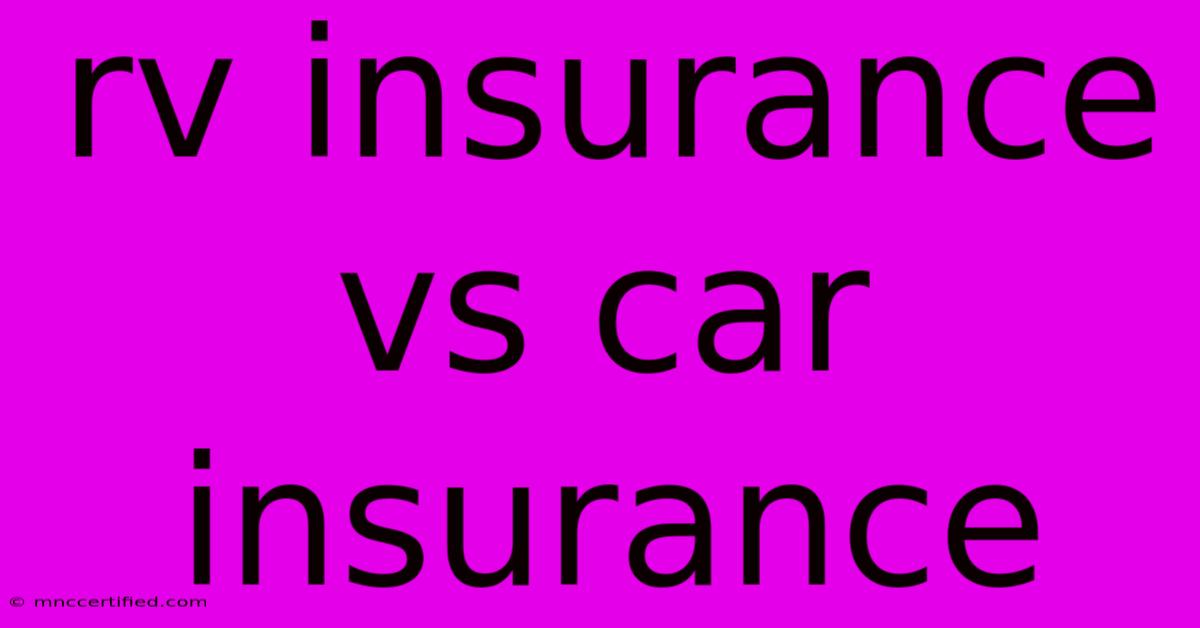Rv Insurance Vs Car Insurance

Table of Contents
RV Insurance vs. Car Insurance: What's the Difference?
Choosing the right insurance for your recreational vehicle (RV) is crucial. While it might seem like your car insurance will suffice, significant differences exist that could leave you financially vulnerable in case of an accident or damage. This comprehensive guide will delve into the key distinctions between RV insurance and car insurance, helping you make an informed decision.
Key Differences: RV Insurance vs. Car Insurance
The primary difference boils down to coverage. Car insurance policies are designed for automobiles used primarily for commuting and everyday driving. RVs, on the other hand, are often used for extended trips, camping, and potentially carrying valuable personal belongings. This difference necessitates specialized coverage.
1. Coverage for Specific RV Features
Car insurance policies typically don't cover features unique to RVs:
- Awning damage: Wind or accidental damage to your RV awning is usually covered under an RV insurance policy but not a standard car insurance policy.
- Appliances: Damage to refrigerators, ovens, microwaves, or other appliances inside your RV falls under RV insurance.
- Specialized equipment: Coverage for things like solar panels, satellite dishes, or generators is often included in RV insurance plans but not car insurance.
2. Liability Coverage: A Bigger Risk with RVs
Liability coverage protects you if you cause an accident that injures someone or damages their property. The potential liability associated with an RV accident is often significantly higher than with a car accident due to:
- Larger size and weight: RVs can cause more extensive damage in an accident.
- Higher speeds: RVs, especially Class A motorhomes, can travel at highway speeds, increasing the severity of potential collisions.
- Towing capacity: Damage caused by a towed vehicle is typically covered under RV insurance.
Therefore, higher liability limits are often necessary and recommended for RV insurance.
3. Personal Belongings Coverage
RVs often carry significantly more personal belongings than a car. RV insurance typically offers coverage for items stolen or damaged while your RV is parked or in transit, a coverage often lacking or limited in car insurance policies. This is especially critical considering the valuable equipment and personal items frequently stored within RVs.
4. Coverage for Different Types of RVs
RV insurance caters to the diverse types of RVs:
- Class A Motorhomes: These large vehicles require specialized coverage due to their size and value.
- Class B Motorhomes (Campervans): Insurance needs will vary based on features and modifications.
- Class C Motorhomes: Coverage falls somewhere between Class A and Class B.
- Travel Trailers and Fifth Wheels: These towable RVs require specific coverage for both the trailer and the towing vehicle (though the towing vehicle will likely have its own separate car insurance).
5. Cost Considerations
RV insurance premiums are generally higher than car insurance premiums because of the higher risk and value of the vehicle and its contents. Several factors influence the cost, including the RV's type, age, value, location, and your driving record.
What to Look for in an RV Insurance Policy
When choosing RV insurance, consider these factors:
- Liability coverage: Ensure you have sufficient liability coverage to protect yourself financially in case of an accident.
- Comprehensive and collision coverage: These protect your RV from damage caused by accidents or other events.
- Uninsured/underinsured motorist coverage: This protects you if you're involved in an accident with an uninsured or underinsured driver.
- Roadside assistance: This can be invaluable when you're stranded far from home.
- Personal belongings coverage: Make sure the coverage is sufficient to protect your valuable items.
Conclusion: Protecting Your Investment
Choosing between RV insurance and car insurance for your RV is not a choice; RV insurance is a necessity. While your car insurance might provide some limited coverage, it's unlikely to offer the comprehensive protection needed for the unique risks and values associated with RV ownership. Failing to obtain proper RV insurance leaves you vulnerable to significant financial losses in case of an accident or damage. Thoroughly research and compare different RV insurance providers to find the best policy that fits your needs and budget. Remember to always disclose all relevant information to your insurer to ensure accurate coverage.

Thank you for visiting our website wich cover about Rv Insurance Vs Car Insurance. We hope the information provided has been useful to you. Feel free to contact us if you have any questions or need further assistance. See you next time and dont miss to bookmark.
Featured Posts
-
Blank Insurance Card Template
Nov 28, 2024
-
Laparkan Trading Miami Florida
Nov 28, 2024
-
Heist Insurance Ocean City Nj
Nov 28, 2024
-
Israel Hezbollah Ceasefire World Reacts
Nov 28, 2024
-
Lebanon Israel Ceasefire Regional Progress
Nov 28, 2024